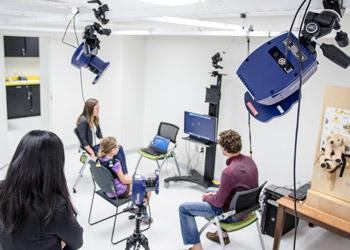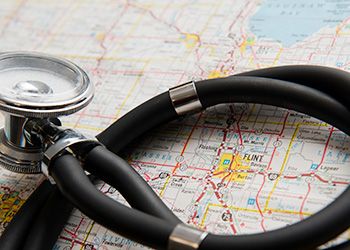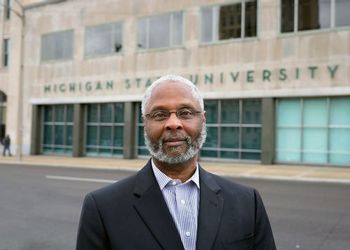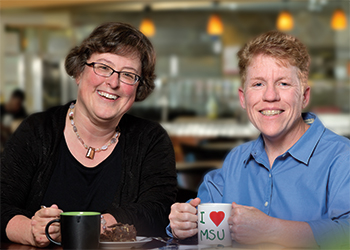Creating Space for Innovation
“Unlike the classroom environment, I think that being in a lab allows [students] more freedom to try different things without fear of failure.”
January 8, 2015
On the banks of the Red Cedar is a nearly 100-year-old brick building. IM Circle is situated next to the Beal Botanical Gardens and nearby the Sparty statue. It has long been home to the Department of Kinesiology.
Inside, much of the building looks straight out of the yearbooks, with long rows of trophy cases among classrooms and office spaces—but there are also new surprises in this old building.
In the basement, you will find vibrantly colored floors and walls leading into new lab spaces for the cognitive and motor neuroscience team. The labs are now the central location of technology, innovation and research for the largest faculty group in the department.
Three new faculty members have joined the growing team, with expertise and interests ranging from infant physical activity to motion analysis. They are using high-tech materials, including programmable robots that are built like arms, and ordinary equipment that you may find in your own home, such as a treadmill. With these tools, faculty members are conducting research projects that may change the way we understand the brain and its functions.
“The renovations are integral to the success of the Department of Kinesiology because they enable us to update and expand our presence in cognitive and motor neuroscience research,” said Professor Alan Smith, chairperson of the department. “They also enable us to form new research collaborations with colleagues across campus (e.g., engineering) and accommodate more undergraduate research experiences.”
Transforming lives
The $905,000 renovation took about six months to complete, transforming 2,790 square feet of old locker rooms into the modern tech spaces. Each room is dedicated to a particular professor and research area. This is not the first time old locker room space has been renovated in the building: There have also been first-floor renovations supporting more office space and research on the effects of exercise and physical activity.
In the last decade, the number of kinesiology and athletic training students has grown by more than 75 percent. As the class sizes have expanded, so have the opportunities within the college and department, which is just one of the many reasons these new labs and equipment are so exciting.
“Unlike the classroom environment, I think that being in a lab allows [students] more freedom to try different things without fear of failure,” said Assistant Professor Rajiv Ranganathan, a new faculty member who studies motor learning. “I love that we have this space where we get to come up with some creative ideas and test these ideas by doing neat experiments.”
Students work as assistants with faculty members and have hands-on experience with some of the gadgets—one of which looks like it came straight off a Hollywood movie set. Armed, literally, with infrared retroflective markers that reflect light back toward eight cameras, researchers can see motions in real time. Similar technology is used in creating computer-generated images (CGI) for films. Immersing themselves into the technology, and assisting with the research being conducted, gives students a hands-on experience to help them progress in their learning.
The power of the renovations extends beyond the classroom and into the community as well. How exercise affects youth with brain disabilities, how children learn motor skills and how individuals post-stroke can re-learn motor skills—these are just a few of the things faculty members are studying that could have a greater impact on the world.
The new lab spaces were unveiled to the public in September 2014, and are currently buzzing with activity. It won’t be long before this historical building on campus makes more strides with the research happening in its newly renovated halls.
Constructing the community together
The Department of Kinesiology is currently ranked sixth in the nation by the National Academy of Kinesiology. In its over 100-year history, the department has always upheld the same goals: innovation and excellence. The College of Education shares these goals and helps reach them through notable faculty members, celebrated research and state-of-the-art facilities.
The addition of the cognitive and motor neuroscience lab spaces has again breathed new life into an aging building, and the department remains in the spotlight as one of the places to be for research. Both Michigan State University and the college funded the renovations, but continue to seek philanthropic gifts to achieve more ambitious goals, further utilizing spaces in IM Circle and Erickson Hall.
Today, external funding for research exceeds the financial support the College of Education receives from the university, and we need to expand our facilities to accommodate our increasing research volume. This is especially true at Erickson Hall, home to three of our four departments and fast outgrowing available space for research.
Programs within the college are consistently rated in the top of the nation, and Michigan State hopes to continue to set the College of Education above its peers with proposed additions to Erickson Hall. Three floors of additional research, office and classroom space is needed to continue to attract top scholars and funding opportunities. Additional scholars, and space for them, will also help benefit current students within the college as they grow during their years at Michigan State and into their careers.




